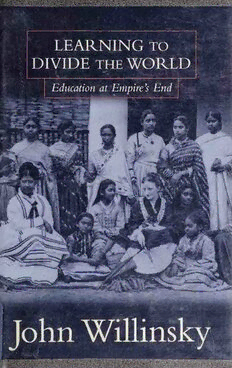
Learning to Divide the World: Education at Empire's End PDF
Preview Learning to Divide the World: Education at Empire's End
LEARNING to WORLD DIVIDE THE “The barbarian rules by-force; the culti- vated conqueror teaches.’’This maxim from the age ofempire makes explicit the usually hidden connections between education and conquest. In Learning to 'Divide the John Willinsky brings these correlations to light, offering a balanced, humane, and beautifully written account ofthe ways that imperi- alism’s educational legacy continues to separate us into black and white, east and west, primitive and civilized. Considering a dazzling range of how subjects,Willinsky discusses the New discovery ofthe World inspired European culture with “the desire to take-hold ofthe world ... to enumerate, order, identify, and differentiate.’’ Willinsky reveals how this “wiU to ' Square know” became a foundation ofthe PUBUCUBRARY 9 apparatus ofimperialism, as shown in r phenomena ranging from zoos to the Museum British to National Geographic. Copley Through analyses ofcolonial schooling, BOSTON anthropology, and the formation ofaca- demic subjects instrumental in the expansion ofempire (history, geography, science, language and literature), Willinsky argues that education was and is the research and development arm of imperialism. Drawing on contemporary classrooms and materials, he considers how schools continue to educate the V young within the “colonial imaginary.” Through primary texts, cutting-edge scholarship, and students’ voices, Willinsky examines schooling itself, arguing for the incorporation ofthe imperial legacy into a multicultural education that does not dismiss the achievement ofthe West but gives an account ofthe divided world that ' achievement has created. ^ ^ #7 7 Digitized by the Internet Archive, 2017 with funding from in Kahle/Austin Foundation https://archive.org/details/learningtodivideOOwill I I * ' < % •» I / % f I I « 4 i \ .1 I \ % \ • I % » V* • / *I s # « I f \ \ I I j V t 1 N • 9 1 / 4 1 t 9 • i \ • t r A > % i t .•** I I t LEARNING TO DIVIDE THE WORLD Engraving in G. E. Rtimphius, D’Amboinische Rariteitkamer (Amsterdam, 1/41). Courtesy University ofBritish Columbia Library. LEARNING TO THE WORLD DIVIDE End Education at Empires John Willinsky M University of Minnesota Press IN NE Minneapolis SO TA London — Excerpt from “Little Gidding,” in Four Quartets, copyright 1943 byT. S. Eliot and & renewed 1971 by Esme Valerie Eliot, reprinted by permission of Harcourt Brace Company (U.S. rights) and Faber and Faber Ltd. (world English language rights ex- cluding U.S.). Excerpt from “Crusoe’s Journal” from Collected Poems 1948—1984 by Derek Walcott. Copyright 1986 by Derek Walcott. Reprinted by permission of Farrar, & Strauss Giroux, Inc. (U.S. rights) and Faber and Faber Ltd. (U.K. rights). An earlier version ofchapter 6 was published as “Beyond 1492-1992: A Postcolonial Supplement to the Canadian Curriculum,” Journal of Curriculum Studies 26 (6): 613-29, and an earlier version of chapter 9 was published as “Frye among (Post- colonial) Schoolchildren,” Canadian Childrens Literature 79: 6—24; reprinted here with permission. Copyright 1998 by the Regents ofthe University of Minnesota All rights reserved. No part of this publication may be reproduced, stored in a re- trieval system, or transmitted, in any form or by any means, electronic, mechanical, photocopying, recording, or otherwise, without the prior written permission of the publisher. Published by the University ofMinnesota Press 1 1 1 Third Avenue South, Suite 290 MN Minneapolis, 55401-2520 http://www.upress.umn.edu Library ofCongress Cataloging-in-Publication Data Willinsky, John, 1950— Learning to divide the world : education at empire’s end / cm. p. Includes bibliographical references (p. 2—65) and index. ISBN 0-8166-3076-3 (he alk paper). ISBN 0-8166-3077-1 (pb) : — — 1. International education. 2. Education Great Britain Colonies — History. 3. Pluralism (Social sciences) Study and teaching. — 4. Interdisciplinary approach in education. 5. Education Social aspects. 1. Title. LC1090.W53 1998 306.43—DC21 97-43232 Printed in the United States ofAmerica on acid-free paper The University ofMinnesota is an equal-opportunity educator and employer. 10 09 08 07 06 05 04 03 02 01 00 99 98 10 9 8 7 6 5 4 3 2 1 PauL David, andAaron, once more The publication of this book was assisted by a bequest from Josiah H. Chase to honor his parents, Ellen Rankin Chase and Josiah Hook Chase, Minnesota territorial pioneers.
